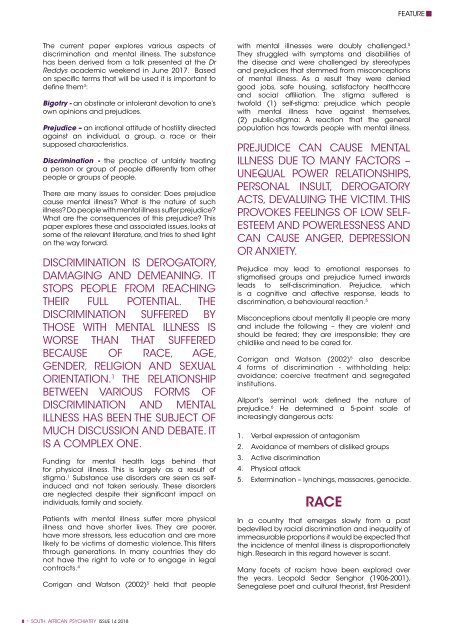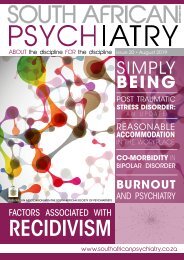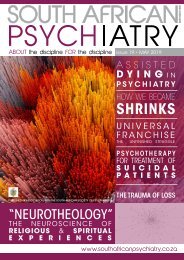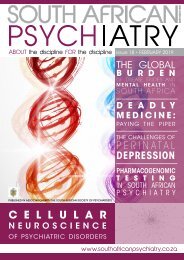South African Psychiatry - February 2018 Edition
South African Psychiatry - February 2018 Edition
South African Psychiatry - February 2018 Edition
You also want an ePaper? Increase the reach of your titles
YUMPU automatically turns print PDFs into web optimized ePapers that Google loves.
FEATURE<br />
The current paper explores various aspects of<br />
discrimination and mental illness. The substance<br />
has been derived from a talk presented at the Dr<br />
Reddys academic weekend in June 2017. Based<br />
on specific terms that will be used it is important to<br />
define them 3 :<br />
Bigotry - an obstinate or intolerant devotion to one’s<br />
own opinions and prejudices.<br />
Prejudice – an irrational attitude of hostility directed<br />
against an individual, a group, a race or their<br />
supposed characteristics.<br />
Discrimination - the practice of unfairly treating<br />
a person or group of people differently from other<br />
people or groups of people.<br />
There are many issues to consider: Does prejudice<br />
cause mental illness? What is the nature of such<br />
illness? Do people with mental illness suffer prejudice?<br />
What are the consequences of this prejudice? This<br />
paper explores these and associated issues, looks at<br />
some of the relevant literature, and tries to shed light<br />
on the way forward.<br />
DISCRIMINATION IS DEROGATORY,<br />
DAMAGING AND DEMEANING. IT<br />
STOPS PEOPLE FROM REACHING<br />
THEIR FULL POTENTIAL. THE<br />
DISCRIMINATION SUFFERED BY<br />
THOSE WITH MENTAL ILLNESS IS<br />
WORSE THAN THAT SUFFERED<br />
BECAUSE OF RACE, AGE,<br />
GENDER, RELIGION AND SEXUAL<br />
ORIENTATION. 1 THE RELATIONSHIP<br />
BETWEEN VARIOUS FORMS OF<br />
DISCRIMINATION AND MENTAL<br />
ILLNESS HAS BEEN THE SUBJECT OF<br />
MUCH DISCUSSION AND DEBATE. IT<br />
IS A COMPLEX ONE.<br />
Funding for mental health lags behind that<br />
for physical illness. This is largely as a result of<br />
stigma. 1 Substance use disorders are seen as selfinduced<br />
and not taken seriously. These disorders<br />
are neglected despite their significant impact on<br />
individuals, family and society.<br />
Patients with mental illness suffer more physical<br />
illness and have shorter lives. They are poorer,<br />
have more stressors, less education and are more<br />
likely to be victims of domestic violence. This filters<br />
through generations. In many countries they do<br />
not have the right to vote or to engage in legal<br />
contracts. 4<br />
Corrigan and Watson (2002) 5 held that people<br />
with mental illnesses were doubly challenged. 5<br />
They struggled with symptoms and disabilities of<br />
the disease and were challenged by stereotypes<br />
and prejudices that stemmed from misconceptions<br />
of mental illness. As a result they were denied<br />
good jobs, safe housing, satisfactory healthcare<br />
and social affiliation. The stigma suffered is<br />
twofold (1) self-stigma: prejudice which people<br />
with mental illness have against themselves,<br />
(2) public-stigma: A reaction that the general<br />
population has towards people with mental illness.<br />
PREJUDICE CAN CAUSE MENTAL<br />
ILLNESS DUE TO MANY FACTORS –<br />
UNEQUAL POWER RELATIONSHIPS,<br />
PERSONAL INSULT, DEROGATORY<br />
ACTS, DEVALUING THE VICTIM. THIS<br />
PROVOKES FEELINGS OF LOW SELF-<br />
ESTEEM AND POWERLESSNESS AND<br />
CAN CAUSE ANGER, DEPRESSION<br />
OR ANXIETY.<br />
Prejudice may lead to emotional responses to<br />
stigmatised groups and prejudice turned inwards<br />
leads to self-discrimination. Prejudice, which<br />
is a cognitive and affective response, leads to<br />
discrimination, a behavioural reaction. 5<br />
Misconceptions about mentally ill people are many<br />
and include the following – they are violent and<br />
should be feared; they are irresponsible; they are<br />
childlike and need to be cared for.<br />
Corrigan and Watson (2002) 5 also describe<br />
4 forms of discrimination - withholding help;<br />
avoidance; coercive treatment and segregated<br />
institutions.<br />
Allport’s seminal work defined the nature of<br />
prejudice. 6 He determined a 5-point scale of<br />
increasingly dangerous acts:<br />
1. Verbal expression of antagonism<br />
2. Avoidance of members of disliked groups<br />
3. Active discrimination<br />
4. Physical attack<br />
5. Extermination – lynchings, massacres, genocide.<br />
RACE<br />
In a country that emerges slowly from a past<br />
bedevilled by racial discrimination and inequality of<br />
immeasurable proportions it would be expected that<br />
the incidence of mental illness is disproportionately<br />
high. Research in this regard however is scant.<br />
Many facets of racism have been explored over<br />
the years. Leopold Sedar Senghor (1906-2001),<br />
Senegalese poet and cultural theorist, first President<br />
8 * SOUTH AFRICAN PSYCHIATRY ISSUE 14 <strong>2018</strong>

















